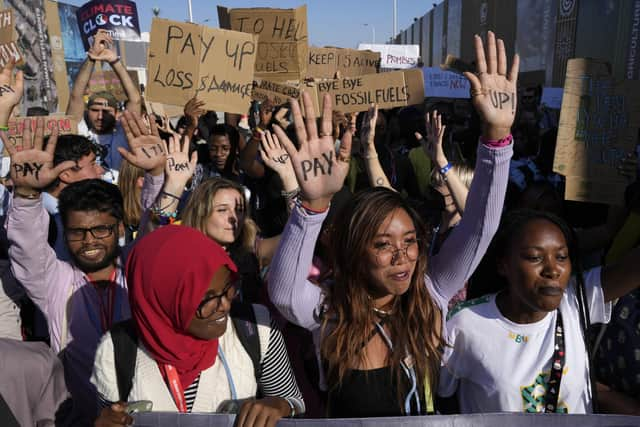Fake news: Could climate disinformation threaten global efforts to save the planet from environmental catastrophe?
The warning comes from Climate Action Against Disinformation (CAAD), an international coalition of organisations campaigning for strategies to deal with large-scale spread of falsehoods about climate change. Members have been at the United Nations summit COP27 in Egypt for the past two weeks, mingling with world leaders, politicians, businesses, activists and members of the public as they gathered to discuss tackling the environmental crisis.
The team has been operating an intelligence unit at the conference, monitoring activities and the messages being communicated around the event. And they have found no shortage of disinformation activities, they say, “from associations and front groups falsifying broad support for highly unpopular fossil fuel policies to bad faith actors attempting to make climate reparations a toxic wedge issue”.
Advertisement
Hide AdAdvertisement
Hide AdThey say platforms such as Google, Twitter, Facebook, TikTok and Reddit as well as some news outlets and advertisers are all contributing to the problem and helping to spread “fake” news. Now they are calling for a united effort to tackle the “dangerous” effect of climate misinformation and greenwashing, which they fear could derail international commitments to cut emissions and keep global warming below the danger level.
So what are the key truths about climate change?
International scientists are in agreement that warming of the planet is an existential threat, the biggest to have ever faced mankind. They have warned that the world is on track for catastrophic impacts – including rising sea levels, increasingly extreme weather, scorching heatwaves, flooding, droughts, wildfires and mass extinctions of wildlife – if global temperatures keep on rising.
They also conclude that human activities, particularly the burning of fossil fuels – namely coal – are to blame for the rapidly increasing heat. And they have calculated that a global temperature rise of 2C above pre-industrial levels will trigger catastrophic and irreversible impacts.
The international Paris Agreement calls for temperature rise to be restricted to 1.5C in a bid to hold back the worst effects, with nearly 200 countries signing up. But data shows the world has already warmed by at least 1.1C, so time for avoidance action is running out.


But not everyone believes these ‘facts’ and promote conspiracy theories. And there are people and businesses spreading these messages, which can have a range of serious consequences – from rolling black on climate action to driving increased violence against climate action advocates.
So where are people most deluded?
A new survey commissioned by CAAD and the international Conscious Advertising Network has revealed the differing attitudes towards climate change in six countries across the world. Polling conducted in the UK, Australia, Brazil, Germany, India and the US found “a significant gap between public perception and the science on issues as basic as whether climate change exists or whether it is mainly caused by humans”, the team said.
For instance, large numbers of respondents said they believe fossil gas is a climate-friendly energy source – contrary to what science demonstrates about its damaging impacts on the environment. This view was most widely held in India, the world’s third-largest emitter of greenhouse gases and a heavy user of coal, where 57 per cent of people said they thought it was true.
The UK scored best on this question, with only 14 per cent of respondents considering gas to be green – compared to 39 per cent of citizens in the US, the second-top climate-polluter, 40 per cent of Brazilians, 34 per cent of Australians and 25 per cent of Germans. Overall, the results shows 55 per cent to 85 per cent of the populations surveyed believe at least one of the climate change misinformation statements included in the questionnaire.
So what can be done?
Advertisement
Hide AdAdvertisement
Hide AdCAAD has sent an open letter to world leaders and delegates at COP27 and bosses of global tech and media firms, demanding concerted efforts and robust policies to stamp out climate misinformation – including fact-checking of claims, adjustments to digital algorithms and tougher scrutiny of advertisers.
The letter has already attracted hundreds of signatures, including many big names involved in tackling climate change. Among those who have signed are: Christiana Figueres, former executive secretary of the United Nations Framework Convention on Climate Change; European Climate Foundation chief Laurance Tubiana; COP20 president and former environment minister for Peru Manuel Pulgar-Vidal; Bill Hare, head of Climate Analytics; as well as advertising industry leaders and brands such as Sky, Patagonia and The Drum.
Comments
Want to join the conversation? Please or to comment on this article.